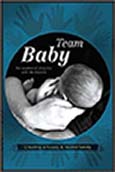Searching for simple truth in a time of complex lies
- IDA GAZZOLA
"Childhood is a privilege," states a government childhood education committee in the 2017 movie The Child in Time.
 Photo by Yoav Hornung on Unsplash.
Photo by Yoav Hornung on Unsplash.
That doesn't ring true to Stephen (Benedict Cumberbatch) whose daughter has been abducted, and the movie goes on to explore the theme of childhood-related loss—a parent's loss of a daughter, the loss of a man who was never allowed to have a real childhood and, ultimately, the loss of all children in a society with repressive rules.
The Child in Time is set in England and based on a novel written in 1987. Quite a lot has changed since then. "Repressive rules" have been replaced almost globally by a child-centric approach that involves affirming any feelings and opinions a child may have, in many cases to the exclusion of the parents. Ironically, however, the loss of childhood in our world has surpassed what is portrayed in the movie, and it's accelerating at a dizzying pace.
Children are exposed to an enormous number of mature topics, with those of a sexual nature topping the list. Society seems unconcerned about shielding children from violence or extremely negative topics.
At the same time another dominant cultural trend encourages individuals to fight back and speak up when something offends them. At first this may seem a good thing, and it would be—IF all parties agreed to have open, honest dialogue.
Unfortunately in most cases the pattern has become one in which an offended party calls out an offence, makes a big fuss, and then expects only accolades in return. The offender is presumed guilty.
In short, society is pushing early sexual awareness fused with closed-minded self-righteousness.
Kids soak up this attitude of being easily offended. Concrete examples abound.
My oldest is 21. We noticed when she first started to watch TV that virtually every parent in cartoons or shows was moronic. If a parent-child relationship was mentioned, it was mostly as a source of conflict.
That's nothing compared to what producers and content creators are foisting onto our kids now. And don't trust the ratings. We watched two shows lately that were rated 7+. We used to feel pretty secure with this rating when sitting down with our 11- and 14-year-olds.
The shows featured blatant adultery (multiple times), a woman changing in front of two men, more swear words than you can count, as well as crude and sexualized language and ideas. And don't get me started on the ads, such as the gum commercial featuring two young girls violently kissing.
Children's books being published now don't even bother to hide their ideologies, that it's okay to be a boy if you are a girl and vice versa, or celebrate changing our pronouns and maybe identifying ourselves by a mental disorder. Even the classics are not immune. A Little Women graphic novel at our local library has Jo coming out as a lesbian.
Society is pushing early sexual awareness fused with closed-minded self-righteousness.
Why all this targeting of children? In her book Awake, Not Woke, Noelle Mering states that "innocence is dominance." Blatant sexuality makes children uncomfortable. A grown man dancing seductively in a bikini might make a little child giggle or look away. This discomfort and innocence points to the fact that there is something abnormal about this way of acting.
Therefore, Mering states, activists are working hard to disabuse children of their innocence in order to revolutionize the culture in a sexually transgressive way. Hence the sexually explicit books in school, the drag queen story hours, and, in our own city this summer, a drag camp led by Vancouver drag artists where boys and girls as young as seven can let their "alter ego hit the stage."
Both Mering and Jordan Peterson have described parents who allow their children to be exposed to auto-gynophilic males as having Munchausen Syndrome by Proxy, a mental disorder on the part of a caregiver who projects illness (or in this case a condition such as transgenderism) onto their child.
These narcissistic caregivers do this, says Peterson, as a display of their moral virtues. This sentiment equally applies to any adult who is in charge of children or who makes policies and decisions that affect children.
What's a parent to do? The answer is obvious: what parents do best. We protect and guide and love our children. We have to be aware of what is going on in our schools, daycares, and summer camps. (A family member came across a bike camp where young cyclists were taught about pronouns). We have to have courage and speak out when things are not right. We need to cancel TV channels and monitor and limit computer time and book selection. We need to talk to each of our children, explaining the errors around them in an age-appropriate manner so that they will know the truth and come to us when they encounter false ideas. We need to teach them to turn off the TV or computer when something questionable occurs. We need to provide good websites containing book and movie reviews so that they can do their own research. We need to be there for them to talk to at all times.
We parents want so badly for our children to be happy and to flourish. We, especially moms, agonize over situations or ideas that might cause harm to our children. We protect them from physical harm the best we can.
But mental harm is much harder to shield them from and, in many ways, more of a worry. If we had the opportunity to give our children some sort of medicine that would protect them from predators or from dangerous ideas that would cause mental harm, wouldn't each of us do it?
We can protect our children from predators and dangerous ideas that cause mental harm through their (and our) relationship with Jesus.
We do have this medicine. The medicine is their (and our) relationship with Jesus. I am aware that I may be losing some of my readers with this statement. I will do my best to explain an idea that has been looming larger and larger in my mind the more years of parenting I survive.
The Holy Spirit (that is, God himself) is in our soul when we are in the state of grace (not in mortal sin). And so God, who made everything—from the universe, to me, to the angler fish my son loves—is really present within me. Although this statement may seem to be addressed to the level of preschoolers, it is born of a realization that hit me with the force of an intellectual and spiritual hurricane recently as we celebrated Pentecost. Truth sometimes cannot be explained except in simple terms. In fact, often the more convoluted something is, the less truth it contains.
Why would God choose to dwell in us? Being God, Jesus could have come to earth, taught us, and left us the Bible and traditions to help us sort our lives out. What's the point of his presence being within us?
The answer is that he wants to be our guide, in the most intimate sort of way. He is the truth that will shine light on what is false and expose it. The Truth that helps us and our children to know who we really are, our identity as children of God.
We need to work at our relationship with God in order to allow him to lead us in the truth. The same is true for our children. We need a friendship, and "friendship implies dealings," as Father Joseph Soria often said.
We need to talk to God. Teach our children to start the day with a Morning Offering and end the day with a bedtime prayer. In between, we can teach them to turn to him in a myriad of ways—thanking him for the sun, praying for a friend in need, saying grace at meals, and reminding them that they are really talking to him and that he is listening to them.
Sunday Mass could very well be the binding agent in our union with God. When I started this article, I had no thought of mentioning Mass. But, as I turned over and over in my mind all the insane ideas being promoted as truth, I kept returning to the idea that sometimes the solution is actually a very simple one.
We can undo the knots of our over-complicated world by turning to what is simple, to God, who made us and who is purely truth and love, with no grey areas, no admixture of confusion or little stains here and there.
So let's welcome him, first at Sunday Mass, then all the rest of the week, inviting him to dwell more fully in our soul. With this welcome, he will slowly pull straight the knots of complication, soothe the fires of anxiety, and help us to see the full beauty of life as it is in reality.
 This is Meaghen Gonzalez, Editor of CERC. I hope you appreciated this piece. We curate these articles especially for believers like you.
This is Meaghen Gonzalez, Editor of CERC. I hope you appreciated this piece. We curate these articles especially for believers like you.
Please show your appreciation by making a $3 donation. CERC is entirely reader supported.

Acknowledgement
 Ida Gazzola. "Searching for simple truth in a time of complex lies." The B.C. Catholic (June 13, 2023).
Ida Gazzola. "Searching for simple truth in a time of complex lies." The B.C. Catholic (June 13, 2023).
Reprinted with permission from The B.C. Catholic.
The Author
 Ida Gazzola is a freelance writer, author of Team Baby: Creating a Happy and Rested Family, and mother of seven who lives in Burnaby.
Ida Gazzola is a freelance writer, author of Team Baby: Creating a Happy and Rested Family, and mother of seven who lives in Burnaby.


